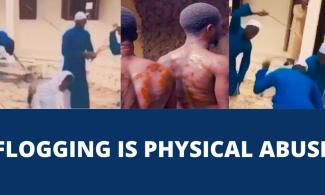
The Quran and hadith provides for reprimanding that has to be proportionate to the crime as interpreted by local Sharia practices.
When I saw the viral video of students at an Islamic school in Kwara state being flogged for violating school rules, I couldn’t help but remember my time attending Islamic schools in Lagos Island. Although I had received some incredible beatings at the hands of my teachers as well, I wasn’t so humiliated as having the videos of my flogging posted for the world to see. Perhaps the only good thing to have come out of this episode is that the viral outcome of the video culminated in the Kwara State Government promising to clampdown on such abusive and humiliating treatment of human beings. But four key issues are still begging for concrete discussion, which, if neglected, may prevent parents and teachers from really understanding why flogging isn’t an act of disciplining a ward but a blatant violation of the ward’s rights and dignity.

First, as someone who was an Islamic teacher at some point, I understand that corporal punishment for bad behavior is a permitted action under Sharia as practiced across the Islamic world. The Quran and hadith provides for reprimanding that has to be proportionate to the crime as interpreted by local Sharia practices. However, Kwara state does not exist within a country where Sharia law is of universal application. Even if we assume that the school saw itself as having permission to apply corporal punishment since the setting was Islamic, it was still located in a state not operating under Sharia law.
With the school having no legal authority to apply such corporal punishment since Kwara state has not institutionalized Sharia law, its actions must then be seen as violation of rights of the individuals in the video. This absence of legal grounds means that the state has to consider prosecuting those culpable of applying corporal punishment in Islamic school settings moving forward. To do otherwise would be encouraging lawlessness and abuse.
Second, the excessive application of corporal punishment is one of the reasons why adolescents are boycotting Islamic school.
In the Lagos Island of the 2000s, I can hardly remember any Muslim friend or neighbor of my age who didn’t attend an Islamic school. Other Muslim neighbors whose children or relatives came visiting during the summer holidays from Kwara or Ibadan would often boast about how they had graduated one or two classes at their Islamic schools since the last time we met. Nowadays, none of my younger siblings or the children of my relatives in Kwara or Ibadan are as enthusiastic about attending Islamic school as we were. The flogging culture has made many parents stop enrolling their children in Islamic schools.
Third, it seems as though the country has yet to grapple with the reality of childhood trauma. It’s no news that children that are subjected to physical abuses like severe flogging, in the nature of that seen in the Kwara Islamic school video, are at higher risk of engaging in violent crimes when grown.
How dare we wonder why crime among young Nigerian adults has been rising in the last decade when our society is guilty of creating traumatized adults? It’s not the case that people only sustain life-defining trauma when sexually abused. Although sexual abuse is in a league of its own, we must understand that adolescents’ psychological response to traumatizing events is not parallel.
A child’s emotion may become forever distorted by sustained years of flogging at an Islamic school, while another subjected to sexual abuse may become less emotionally distorted. It all depends on the adolescent’s psychological state and the severity of traumatizing experienced in consideration. We should not assume that because certain people went to Islamic schools and got flogged but eventually become better humans, every other adolescent will turn out the same.
Fourth, it is evident that even though times have changed, the operation of Islamic schools across Nigeria is still stuck in the past that cannot coexist with an antithetical present. Nowadays, there can’t be any sugar quoting of physical abuse as simply punishment. We also cannot hide criminal actions under the guise of cultural norms.
It was the norm in the 1990s and the 2000s to flog students enrolled in an Islamic school for consuming alcohol or attending wild parties. It is the norm in the 2020s, more so going back to the 2010s, to consider flogging as a criminal offense.
The government and the public’s reaction must go beyond outrage and condemnation. Instead, it must be made clear that any cleric or school guilty of physically abusing students in the name of instilling discipline must be made to face the legal consequences.
Ibrahim B. Anoba (Bàbátúndé Anọ́ba) is a Nigerian journalist and columnist for Sahara Reporters. He is also an Africa fellow at Atlas Network. He tweets via @Ibrahim_Anoba.